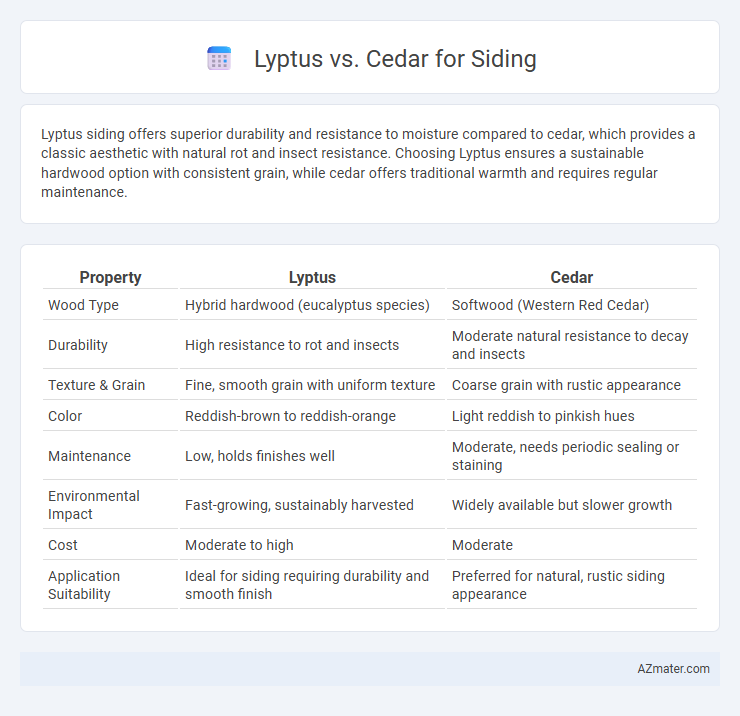Lyptus siding offers superior durability and resistance to moisture compared to cedar, which provides a classic aesthetic with natural rot and insect resistance. Choosing Lyptus ensures a sustainable hardwood option with consistent grain, while cedar offers traditional warmth and requires regular maintenance.
Table of Comparison
| Property | Lyptus | Cedar |
|---|---|---|
| Wood Type | Hybrid hardwood (eucalyptus species) | Softwood (Western Red Cedar) |
| Durability | High resistance to rot and insects | Moderate natural resistance to decay and insects |
| Texture & Grain | Fine, smooth grain with uniform texture | Coarse grain with rustic appearance |
| Color | Reddish-brown to reddish-orange | Light reddish to pinkish hues |
| Maintenance | Low, holds finishes well | Moderate, needs periodic sealing or staining |
| Environmental Impact | Fast-growing, sustainably harvested | Widely available but slower growth |
| Cost | Moderate to high | Moderate |
| Application Suitability | Ideal for siding requiring durability and smooth finish | Preferred for natural, rustic siding appearance |
Introduction to Lyptus and Cedar Siding
Lyptus siding, derived from a hybrid eucalyptus tree, offers a sustainable and fast-growing alternative to traditional wood siding with a consistent grain and rich reddish hue. Cedar siding, known for its natural resistance to decay and insect damage, provides a classic aesthetic with a variety of textures ranging from smooth to rustic. Both materials deliver durability and beauty, but Lyptus features a tighter grain and harder composition compared to the softer, aromatic cedar options favored for their timeless appeal.
Origin and Sustainability of Lyptus vs Cedar
Lyptus wood, originating from fast-growing Eucalyptus trees in Brazil, offers a sustainable alternative due to its rapid harvest cycle and certification by the Forest Stewardship Council (FSC). In contrast, cedar, primarily sourced from old-growth forests in the Pacific Northwest, faces concerns over slower regrowth and overharvesting, which impact long-term sustainability. Lyptus's plantation-based origin ensures consistent supply with lower environmental impact compared to traditional cedar harvesting practices.
Appearance and Aesthetic Differences
Lyptus siding offers a uniform, smooth grain with a warm reddish-brown hue that deepens over time, providing a consistent and modern aesthetic. Cedar siding showcases a more pronounced, natural grain with varying knots and a palette ranging from light amber to deep reddish tones, creating a rustic and textured charm. The visual appeal of Lyptus leans toward sleek and contemporary designs, while cedar emphasizes traditional, natural beauty for exterior cladding.
Durability and Weather Resistance
Lyptus wood, engineered from Eucalyptus urophylla, exhibits exceptional hardness and resistance to wear, making it a durable option for siding with strong weather resistance properties. Cedar, known for its natural oils and cellular structure, offers outstanding resistance to moisture, decay, and insect damage, enhancing its longevity in diverse climates. Both woods provide robust durability, but cedar's inherent weather resistance often outperforms Lyptus in environments with high humidity and frequent rainfall.
Maintenance Requirements
Lyptus siding requires minimal maintenance, needing only occasional cleaning and periodic sealing to retain its durability and resistance to pests and moisture. Cedar siding, while naturally resistant to decay and insects, demands regular staining or painting and more frequent inspections to prevent weather-related damage and maintain its aesthetic appeal. Both materials benefit from prompt repairs, but Lyptus offers a lower overall upkeep burden compared to cedar.
Cost Comparison: Lyptus vs Cedar
Lyptus siding generally costs less than cedar, with prices averaging around $3 to $5 per square foot for Lyptus compared to $4 to $7 per square foot for cedar. Lyptus offers a durable, sustainable hardwood option that provides good value for budget-conscious homeowners seeking an alternative to the higher-priced cedar siding. Maintenance and lifespan also affect long-term costs, with cedar requiring more frequent sealing and repairs, potentially increasing overall expenses.
Eco-Friendliness and Certifications
Lyptus siding is highly eco-friendly, made from fast-growing eucalyptus trees, harvested from sustainably managed plantations certified by the Forest Stewardship Council (FSC). Cedar siding, often sourced from natural forests, may carry certifications like FSC or Sustainable Forestry Initiative (SFI), but slower growth rates result in less renewable supply compared to Lyptus. Both materials offer environmentally responsible options, with Lyptus typically providing a lower-impact footprint due to its rapid renewability and strict certification standards.
Installation Considerations
Lyptus siding offers a uniform grain and higher density, making it easier to cut and less prone to splintering during installation compared to cedar. Cedar siding requires pre-drilling to prevent splitting due to its softer, more fibrous texture, and also demands more frequent sealing to maintain durability. Both materials benefit from using stainless steel nails to resist corrosion, but Lyptus's dimensional stability reduces the risk of warping and ensures a smoother installation process.
Performance in Different Climates
Lyptus offers superior durability and resistance to moisture, making it highly effective in humid and rainy climates, while cedar excels in cold and dry conditions due to its natural insulating properties and ability to withstand temperature fluctuations. Lyptus's dense grain structure reduces warping and deterioration, ideal for coastal environments with high salt exposure. Cedar's natural oils act as a deterrent against insects and decay, supporting long-term performance in arid or seasonal climates.
Final Verdict: Which is Best for Siding?
Lyptus offers superior durability, resistance to decay, and a consistent grain ideal for siding applications, making it a strong candidate for long-term exterior use. Cedar provides natural weather resistance, excellent insulation properties, and an aesthetic appeal with its rich color and texture, often favored for classic siding designs. For siding projects prioritizing durability and uniformity, Lyptus is the best choice, while cedar suits applications where natural appearance and traditional charm are desired.

Infographic: Lyptus vs Cedar for Siding
 azmater.com
azmater.com